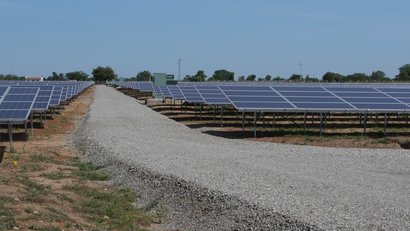
Uganda is employing a number of different solutions to expand its decentralised electricity supply, particularly solar, hydropower and energy from biomass. The Get FiT programme (Global Energy Transfer Feed in Tariff) is an essential contributor to the country’s energy transition which aims to facilitate private investments in renewable energies. In total, it will help to finance 17 small power plants generating up to 160 MW in total. KfW is helping to finance the programme on behalf of the German Federal Government, along with other donors.
Since the middle of 2015, one of the Ugandan power plants has been producing energy from bagasse, a waste product from sugar cane processing. The first solar power plant was connected up to the grid in November and, with 10 megawatts, is at the same time the largest private solar power plant in the whole of East Africa. The first hydropower station followed in March 2017 as part of the Get FiT programme. Additional projects are also underway. There is certainly demand given that only 15 per cent of people in Uganda have access to electricity.
KfW is supporting the programme through financial contributions of approximately 94 million euros, providing a much-needed boost to private investments of about 440 million euros. Until recently, private sector commitment in this area was fairly restrained, because the feed-in tariffs were insufficient, the political and economic conditions presented too many risks and there was a lack of available capital. KfW's support has now helped pave the way for private investors. It is now possible for them to commit to energy production, since the subsidies to the existing feed-in tariffs makes investment cost-effective. Moreover, the contract documents have been standardised, making the approval processes shorter. The investors now have greater security.
The first signs of success are beginning to appear: the processing time for awarding licences has been reduced to between one and two months. In 2016 alone, 1,500 jobs were created for unskilled and specialist workers in power plant construction.
The model is catching on, in that other countries in Africa, such as Zambia, want to adopt the programme and even Vietnam is showing interest.
For additional information:

